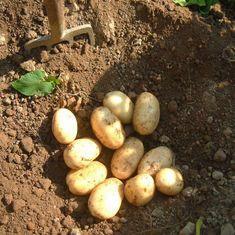
Pan European Potato Enterprise Limited (PEP Ltd) has been established since 1993 but, according to managing director Juan Castella, the business had been lying dormant for a decade before he parted company with Agrolon Ltd to head it up in 2003.
While Castella’s decision to move was not exactly self-made, the venture has proven positive and he hastens to clarify that he bears his former employers no ill will. “The shareholders at Agrolon decided, for whatever reason, to sell all the seed and table markets, outside of the Spanish market, to another company without much consultation,” says Castella. “Many of the markets were developed under my own initiative so several of the contracts stayed with me and the majority of my colleagues decided to come with me to PEP when I resigned.”
In the last two years, Castella has been striving to build up a reputation for his new business and continue to serve his loyal customers. PEP Ltd is focused exclusively on potatoes and has involvement in both imports and exports from the UK.
The company exports seed and table potatoes from Great Britain and Northern Ireland to several countries. The most important are: Spain (mainland, Balearics and Canaries), Portugal (including Azores and Madeira), Morocco, Saudi Arabia, Italy, Slovenia, Croatia, Hungary and Thailand, with 50 per cent of all sales made in the Spanish territories. PEP is currently responsible for 40-45 per cent of the total potato exports from UK to the Canary Islands.
PEP is also the exclusive distributor for Irish Potato Marketing in the Spanish territories and the main distributor in Portuguese territories. In addition, it collaborates very closely with Cygnet PB in marketing its varieties abroad.
For 2004/2005, PEP has reported a turnover of 48400 million tonnes, amounting to £12m; an eight per cent rise on the previous year. This includes 14,300mt of seed, a 20 per cent increase on 2003-04, 26,700mt of table potatoes, and 6,500mt of potato imports into the UK.
Despite waning consumption levels in the UK, Castella says there is still a demand for imported produce and the company imports around 6,000mt of potatoes, predominantly used for chipping: 4,000mt from mainland Spain and Portugal and 2,000mt of new potatoes from the Balearics.
Of the company’s UK seed production, 95 per cent is grown in Scotland, which has a good following says Castella. “We consider Scotland to have a good quality seed of a very high grade. Scottish seed potatoes have got a very good reputation and the demand for Scottish potatoes is generally very good. The only thing is, Scotland is a bit short on protected varieties for export.”
However, while Dutch breeders hold the rights to most protected varieties, the main Dutch companies have now established themselves in Scotland, says Castella. “This allows them to orientate themselves towards the markets they cannot supply from the Netherlands or are better supplied from Scotland. Scottish seed exports are only one tenth of the size of the Dutch exports but in England around 70 per cent of the potatoes planted are with Scottish seed.”
Around 5,000mt, or 35 per cent, of PEP’s seed exports are protected varieties under contract to PEP for specific markets. “The main varieties are Druid, Cara, Red Cara, Slaney, Ambo, Shannon, Cabaret, Maris Bard, Kikko, Carlingford, Banba, Navan, Orla and we are introducing new varieties such as Galactica, Camelot, Nectar, Setanta, Isle of Jura, Bambino, Bonnie and more,” Castella says. “Potato trials and demonstration potato fields are arranged in several areas.”
The variety Cabaret, developed by Cygnet, and Orla and Kikko developed by IPM, are three new varieties showing particularly good promise, Castella continues. “Cabaret is already becoming very popular in the UK supermarkets as a multipurpose variety and Orla is an early variety which has a very good skin finish and is also accepted by supermarkets. Kikko is doing very well in the Mediterranean and Canaries.”
Castella is hoping to considerably increase sales of seed in the Iberian Peninsula through its sister company. “The ideal situation would be that the potatoes that are grown in Spain are of varieties we represent,” he says. “Then we would sell the UK-produced seed of these varieties in the Iberian Peninsula for PepSur to be able to export the production back to the UK and other markets in the EU.”
As well as having offices based in London, Scotland, the Canary Islands and Northern Ireland, last year, an associated company, PepSur marketing S. L. was established in Spain, to help marketing in the Iberian Peninsula and additional European markets.
“This year PepSur has been involved in exporting to the central European countries that recently joined the EU. The fact that prices have been low has helped,” says Castella. While the UK chipping industry may have reached saturation point, there is definite room for development in the central European countries, he says, and such expansion in this area and elsewhere is one of the company’s major objectives.
“Through PepSur marketing we will be hoping to consolidate and develop the marketing of seed and table potatoes in the Iberian Peninsula and possibly other Mediterranean markets,” he says. “The company will also be trying to develop exports of potatoes from the Iberian Peninsula to the rest of the EU with special emphasis on the UK and central Europe.”
At the same time, PEP is hoping to consolidate its grower base in Scotland and Northern Ireland, with the intention of reaching 25,000mt of exports of seed by season 2006/2007, establish a solid table potato grower base in England and continue to develop exports of multi-purpose protected varieties such as the “Cabaret Brand”.



